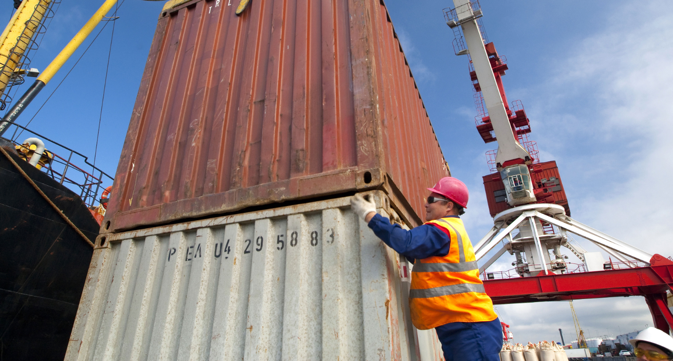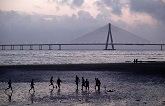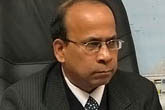Western economic isolation may open way to India

The present crisis provides Russia and India a great opportunity to increase bilateral trade. Source: Sergey Krasnouhov / RIA Novosti
Russia and India have received an unexpected opportunity to increase bilateral trade dramatically. Economic sanctions that the United States and the European Union are preparing against Russia, will force Moscow to reorient its trade to the East.
Over the last few years, Russian policy has been aimed at enhancing cooperation with countries in the Asia- Pacific region. In 2012 Russia held the APEC summit in Vladivostok, which laid the foundation for cooperation with these countries’ economies. The recent past has also witnessed exchanges of high level visits with China and India and. Japan, South Korea, Indonesia, Vietnam and other countries in the region have also become important partners.
Now these initiatives will help preserve Moscow’s economic stability in the wake of potential sanctions by the U.S. and the EU. Moreover, New Delhi could become the main beneficiary as a result of this process, as Russia and India have a large reserve of trade relations that are significantly behind the former’s trade with China, despite the longstanding friendship between the two countries.
India will probably be the tastiest morsel in the world market for Russian companies and in the coming years. Moscow will be interested in a significant intensification of business cooperation with Delhi, says Maxim Pleshkov, a senior analyst at RusRating rating agency.
The first step was the creation of a special research group in order to study the issue of opening a free trade zone between India and the Customs Union in the beginning of March. Its objectives were the definition of the concept of the zone, its scope, the main areas of negotiation and the expected consequences for the participants’ economies. “Working on an FTA with India is a bit slower than it is with other partners for a very simple reason. India’s economy is significantly larger than that of New Zealand or even Vietnam, and in order to form the desired mandate of the joint study group, many issues should be explored,” a source in the Russian Ministry of Economic Development told RIR. “This work is being carried out, and soon the issue will be discussed in the Customs Union, which coordinates such processes.”
Analysts interviewed by RIR doubt that Moscow and New Delhi will be able to rapidly expand their energy trade – Russia's main export commodity. It is still possible for Russia to reorient its oil exports to the East. This requires 2-3 years, says the Rusenergy partner Michael Krutikhin. For this, it is necessary to expand the Eastern Siberia – Pacific Ocean project pipeline and its approaches. With gas, it is more difficult. “The solution is outrageously expensive,” Krutikhin said. However, it is obvious that if the conditions of supply to Europe become completely unbearable, Moscow can close its eyes to the excessive costs.wha
An expansion of trade in complex products from Russia is more likely. India may be interested in the Russian high-tech products, as well as its advanced technology. This applies primarily to weapons, ships for the Indian Navy, aircrafts, export of missile technology and joint development of missiles, as well as cooperation in the field of nuclear energy.
Russian organizations may also participate in the creation and reconstruction of the Indian infrastructure, including the construction of national highways, underground, oil and gas pipelines. “The coal mining field and the engineering industry in India as well as various mutual investments have good potential. For example, India has participated in the reconstruction of the commercial port of Novorossiysk, Indian pharmaceutical companies have invested in the Russian pharmaceutical industry, processing of diamonds, textiles, tea, tobacco, and other agricultural products,” said RusRating’s Pleshkov.
The recent devaluation of the Russian rouble will assist in the expansion of trade. “Against the background of the Russian currency devaluation, a growth of Russia's trade with Asian countries in many segments of consumer products can be expected,” said General Director of Sovtransavtoekspeditsii Leonid Shliapnikov. He says this involves goods such as clothing, shoes, accessories, hardware, electronics and other household items. Moreover, he is confident that the growth will be in both the B2B-segment and B2C segment through e-commerce and catalog sales channels. However, India lags far behind China in the promotion of its own consumer goods in Russia. People in Russian know about them in connection with exotic practices, rather than the usual gadgets or appliances.
Experts believe that the cooling with the West will have some positive impact on the jewellery market in India. Russian companies own a substantial share of the global supplier’s market for nickel, gold, and platinum group metals. “Limiting the supply of platinum in the market may have a negative impact on the European automotive industry, as it will lead to higher prices for parts. There will be a positive impact on the agricultural sector, as Russia may have to also refocus its export of mineral fertilizers.”
All rights reserved by Rossiyskaya Gazeta.
Subscribe
to our newsletter!
Get the week's best stories straight to your inbox


